#from a journal
Text

Louise Glück, The Seven Ages; from ‘From a Journal’
TEXT ID: I wanted you to fall in love. But the arrow kept hitting the mirror and coming back.
479 notes
·
View notes
Text
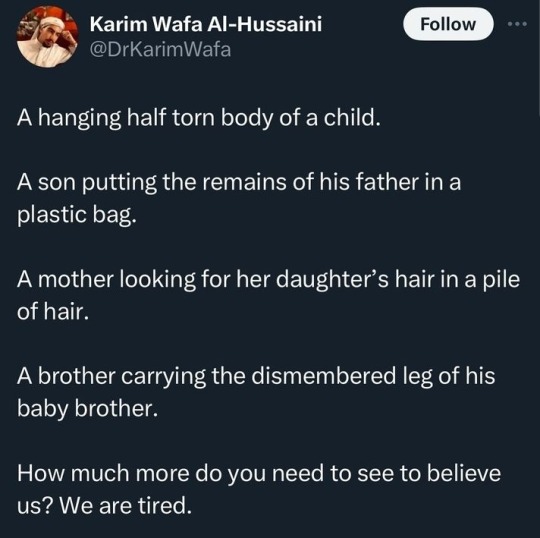
#palestine#free palestine#gaza#free gaza#rafah#save rafah#journalism#gaza journalists#i stand with palestine#from the river to the sea palestine will be free
24K notes
·
View notes
Text

Journalist Moataz Mustafa Al-Ghafri, his wife, and his son, Joud, were martyred as a result the IOF targeting their car, north of Gaza City. He is the 128th journalist to be martyred in Gaza since October 7th.
Glory to the martyrs.
[via RNN]
#palestine#free palestine#free gaza#gaza#israel#jerusalem#from the river to the sea palestine will be free#tel aviv#gaza strip#joe biden#benjamin netanyahu#iof#idf#social justice#news#journalism
6K notes
·
View notes
Text
friend wanted to see my tumblr, and when i told him i can’t show it to him bc it’s basically my personal diary he went “oh so I can’t see it but a bunch of strangers on tumblr can??” he literally does not get me. no one will get me like the people in my phone get me
#It’s just so different#even though it’s public it still feels secret and safe. i feel comfy sharing a lot more on here than I do in my actual day to day life lol#in my head I’m also just speaking to myself 90% of the time which helps#if a friend off tumblr saw my thoughts I’d feel so weird ab it#esp bc they might get the vagueposting about certain situations and tell mutual friends#no thank u. this is for me. I’m not about to start censoring my thoughts bc someone I know knows my tumblr#u guys literally saw me have LIVE BREAKDOWNS#meanwhile I’ll have the worst fucking day in history and tell no one about it. I’m already cripplingly private but way more so in real life#this is basically a low stress journaling outlet for me. it’s so important for me to maintain the separation#like this is actually my diary & has been so handy for letting out emotions / articulating thoughts / staying on track !!#& I’ve met so many kind people on here who actually get me. which is so hard to find irl bc I’m surrounded by pre-med gunners/overachievers#who are by standard not very good w emotion & can be competitive/judgmental. or at least it’s hard for me to be vulnerable in front of them#and I’m part of that crowd so I reserve my emotions only to a handful of very close friends#it’s nice to hop on here and express negative emotions!! or positive emotions!! just whatever I want and it’s low stress and people get me#I don’t have to worry about judgment or competitiveness etc etc#like everyone on here is so kind & nice & understanding. & just a breath of fresh air from the types I run w. it’s just nice to have this#so idk that’s why I think I’ll always be strict about keeping the worlds separate. it just works#p
6K notes
·
View notes
Text

soaps 🧼
#cod#call of duty#john soap mactavish#mw2#my art#look I can do sketches! how bout that#call this a chicken coop the way I'm hatching up a storm#bg images are from soap's journal no I'm not a military tactician~
3K notes
·
View notes
Text

#free palestine#palestine#gaza#free gaza#from the river to the sea palestine will be free#pray for palestine#gaza strip#motaz azaiza#protect journalists#journalism#genocide#mental health#israel is committing genocide#ceasefire#america#usa#israel#permanent ceasefire
3K notes
·
View notes
Text
For old times sake is actually such a heartbreaking and beautiful sentiment. Like, let’s do it for the love that used to be here. It is reason enough.
#random thoughts#long time no update#writing#poets on tumblr#depressing quotes#old friendships#books & libraries#aesthetic#spilled words#fragments of journal#excerpt from a book i'll never write#texts from my ex#existential musings#writerscommunity#literature#words#poetry#heartbreak#sad girl shit#deep quotes#writblr#bookblr#movie quotes#dark romanticism#toxic love#i miss you#love poem#dark academia#light academia#short poems
69K notes
·
View notes
Text



THEY’RE ATTACKING THE LAST FUNCTIONING HOSPITAL IN GAZA
BISAN CALLED FOR A GLOBAL BOYCOTT ON JANUARY 21ST!!! (Edit: to be clear, she called for one on her TikTok live, whereas this video is the one she posted on her Instagram shortly before going live)
NO SCHOOL
NO WORK
NO PLANS
NO SHOPPING
‼️‼️‼️‼️
#important#bisan#free palestine#free gaza#war crimes#genocide#israel#anti israel#idf#iof#current events#palestine#gaza#journalism#journalists#from the river to the sea palestine will be free#nasser hospital#news
2K notes
·
View notes
Text
OKAY so apparently there is a rare type of migraine called a hemiplegic migraine that displays symptoms similar to a stroke, and after a fun little ambulance ride and CT scan I compiled my notes into a timeline of personal symptoms for fitness and for fun
Sharing because why not
Normal visual snow blurs slightly, making reading difficult
Spotty vision, large 'afterimage' type flashes blocking vision, partial blindness
Gradual descent into disorientation, confusion, "floaty" feeling, decreased cognitive function, slightly decreased fine motor function, slightly decreased gross motor function
Trembling in hands
Cold sweat
Mild abnormal difficulty with speech
Cold, tingling numbness of left arm, left side of face, left side of tongue, and roof of mouth.
Rapid increasing pain in left eye, right side of head that peaks at 1 hour, lasting between 5-7 hours, somewhat alleviated by heat packs, ice packs, direct pressure, and OTC pain medication
Mild to moderate nausea
Return of physical sensation after approximately 20 minutes from onset
Gradual return of vision- full return of vision after approximately 2 hours from onset
Gradual return to full cognitive function after approximately 4 hours from onset, along with full return to normal motor function
Continued mild headache in top right side of head for roughly 4 days following
Abnormal increase in fatigue
Return to full normal function
#I'm fine btw#I like making lists so I started Journaling as soon as I could see again and took exact times from my call history lol
2K notes
·
View notes
Text
In Knives Out Blanc wanted to do the murder mystery investigation with Marta so bad, but she was certain she was guilty so she spent a good amount of the movie avoiding/hiding stuff from him
Meanwhile in Glass Onion Helen was fucking carrying the investigation, even while accidentally getting drunk, and even went to investigation lengths Blanc was hesitant to do
#knives out#glass onion#ko: marta actively ruins evidence due to her perceived guilt. blanc knew the entire time she was innocent or ill intent#go: helen fucking diving forward to eavesdrop on duke/miles/whiskey better. helen tossing a tape recorder in birdie's bag. helen listening#in on lionel & claires freak out at the pool. helen did all the research on her sisters journals to get as into the role as possible#marta only standing up for her rightful inheritance at the end after everything vs helen down to ruin those shitheads from the start#i love these movies & the duality in the chars/victims & how it ends. marta gets the house. helen burns miles' down. its just!!!!! AHHH#i just rewatched knives out again so i can rewatch glass onion again tomorrow. im so normal about this series#tc posts#*of ill intent gdi. tumblr mobile let me edit tags
13K notes
·
View notes
Text

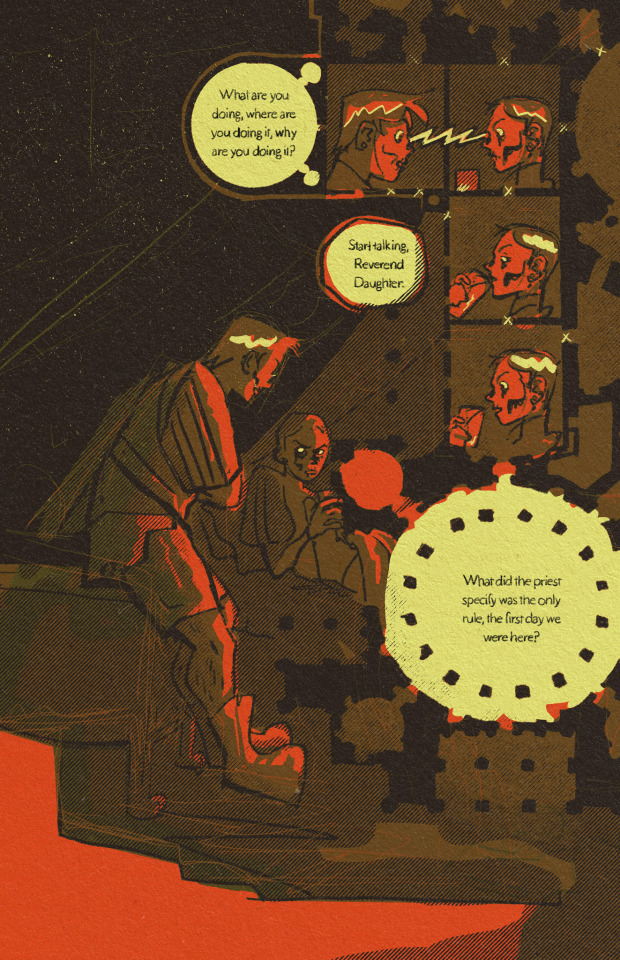
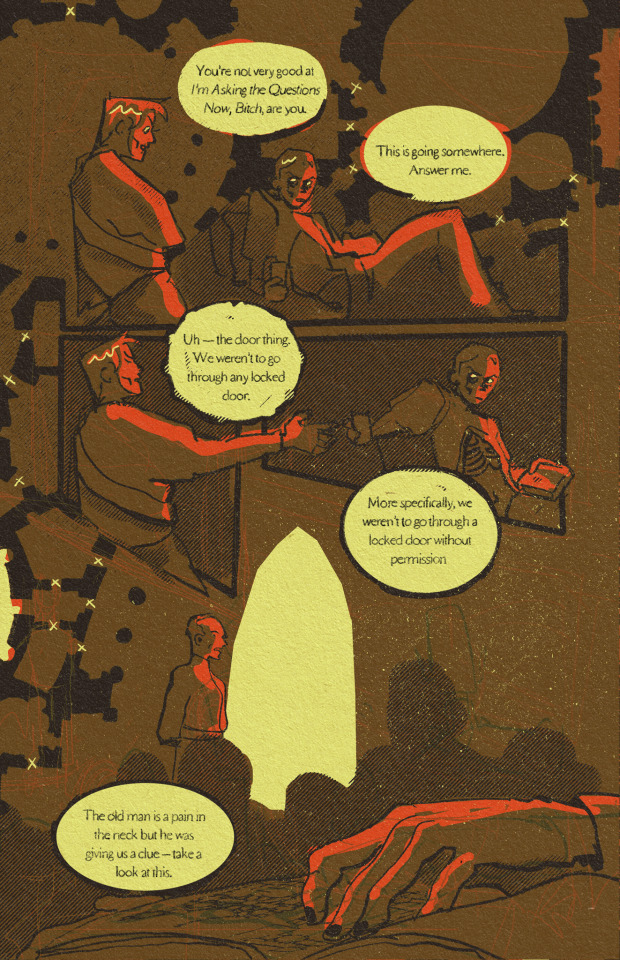


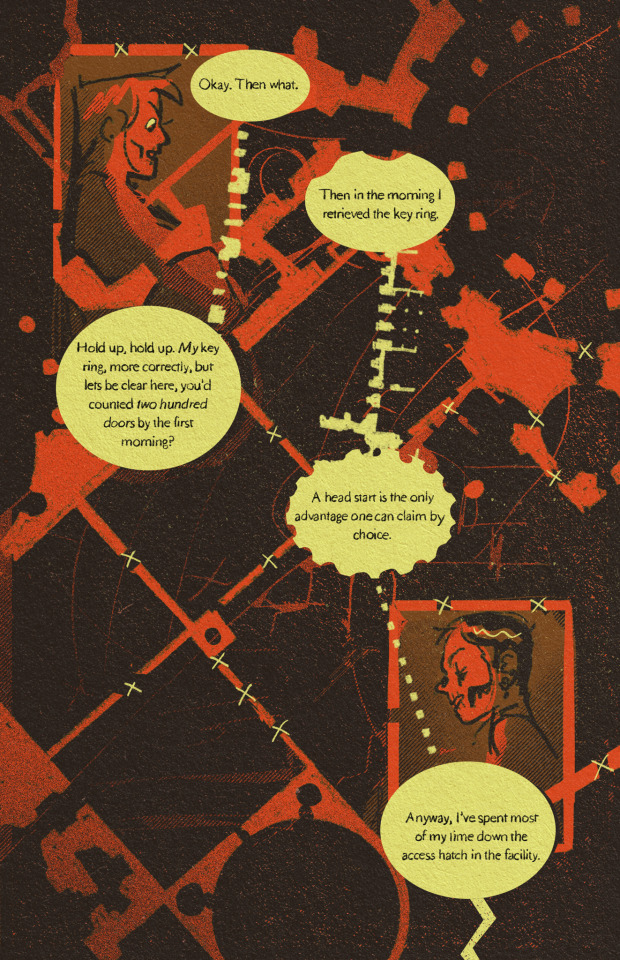

This place is a message... and part of a system of messages... pay attention to it!
#have linked 2 this song before and i will link 2 it again. because HELLO. canaan house thesis statement 2 me.#rlly obsessed w this scene i think i’m just fascinated w the idea of harrows journals…… her drawings of canaan…what else is in there#anyway this was mostly an excuse for me to play around w using architectural drawings as a sort of compositional element/framing device.#did it work? who’s to say. the most important part is that i had fun except. i didn’t even do that.#text is slightly edited for length etc…. + i cut off the scene where i did because well…. makes me insane. lol#don’t pay too much attention 2 the architectural parts they don’t make sense#because i cobbled them together from the plans of like 3 different buildings.#anyway enjoy. or don’t. i’m not ur boss.#the locked tomb#tlt#gideon the ninth#gideon nav#harrowhark nonagesimus#harrow the ninth#okay that’s it
4K notes
·
View notes
Text

Louise Glück, The Seven Ages; from ‘From a Journal’
310 notes
·
View notes
Text
#palestine#free palestine#gaza#free gaza#journalist#from the river to the sea palestine will be free#journalism#free palestine 🇵🇸#end genocide#save palestine#journalists of gaza#palestinian journalists#journal#what the western media won't show#what the news won't show#permanent ceasefire#call for ceasefire#ceasefire now#ceasefire#ceasefire now 🇵🇸#from the river to the sea 🇵🇸#i stand with palestine 🇵🇸#🇵🇸🇵🇸🇵🇸#humanitarian crisis#israeli crimes against humanity#crimes against humanity#no justice no peace#the news lie#the government lied#tiktok post
1K notes
·
View notes
Text

Who it should've been
#free palestine#palestine#gaza#gaza under attack#from the river to the sea palestine will be free#i stand with palestine#palestine under attack#end israeli apartheid#israel apartheid#israel is a terrorist state#israeli apartheid#israel#journalism#time magazine#person of the year
1K notes
·
View notes
Text
How to shatter the class solidarity of the ruling class
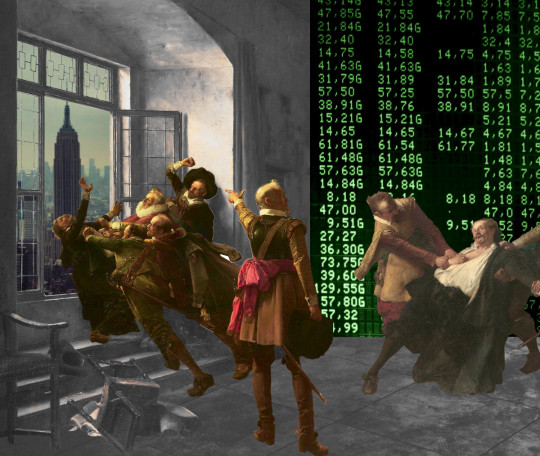
I'm touring my new, nationally bestselling novel The Bezzle! Catch me WEDNESDAY (Apr 11) at UCLA, then Chicago (Apr 17), Torino (Apr 21) Marin County (Apr 27), Winnipeg (May 2), Calgary (May 3), Vancouver (May 4), and beyond!

Audre Lorde counsels us that "The Master's Tools Will Never Dismantle the Master's House," while MLK said "the law cannot make a man love me, but it can restrain him from lynching me." Somewhere between replacing the system and using the system lies a pragmatic – if easily derailed – course.
Lorde is telling us that a rotten system can't be redeemed by using its own chosen reform mechanisms. King's telling us that unless we live, we can't fight – so anything within the system that makes it easier for your comrades to fight on can hasten the end of the system.
Take the problems of journalism. One old model of journalism funding involved wealthy newspaper families profiting handsomely by selling local appliance store owners the right to reach the townspeople who wanted to read sports-scores. These families expressed their patrician love of their town by peeling off some of those profits to pay reporters to sit through municipal council meetings or even travel overseas and get shot at.
In retrospect, this wasn't ever going to be a stable arrangement. It relied on both the inconstant generosity of newspaper barons and the absence of a superior way to show washing-machine ads to people who might want to buy washing machines. Neither of these were good long-term bets. Not only were newspaper barons easily distracted from their sense of patrician duty (especially when their own power was called into question), but there were lots of better ways to connect buyers and sellers lurking in potentia.
All of this was grossly exacerbated by tech monopolies. Tech barons aren't smarter or more evil than newspaper barons, but they have better tools, and so now they take 51 cents out of every ad dollar and 30 cents out of ever subscriber dollar and they refuse to deliver the news to users who explicitly requested it, unless the news company pays them a bribe to "boost" their posts:
https://www.eff.org/deeplinks/2023/04/saving-news-big-tech
The news is important, and people sign up to make, digest, and discuss the news for many non-economic reasons, which means that the news continues to struggle along, despite all the economic impediments and the vulture capitalists and tech monopolists who fight one another for which one will get to take the biggest bite out of the press. We've got outstanding nonprofit news outlets like Propublica, journalist-owned outlets like 404 Media, and crowdfunded reporters like Molly White (and winner-take-all outlets like the New York Times).
But as Hamilton Nolan points out, "that pot of money…is only large enough to produce a small fraction of the journalism that was being produced in past generations":
https://www.hamiltonnolan.com/p/what-will-replace-advertising-revenue
For Nolan, "public funding of journalism is the only way to fix this…If we accept that journalism is not just a business or a form of entertainment but a public good, then funding it with public money makes perfect sense":
https://www.hamiltonnolan.com/p/public-funding-of-journalism-is-the
Having grown up in Canada – under the CBC – and then lived for a quarter of my life in the UK – under the BBC – I am very enthusiastic about Nolan's solution. There are obvious problems with publicly funded journalism, like the politicization of news coverage:
https://www.theguardian.com/media/2023/jan/24/panel-approving-richard-sharp-as-bbc-chair-included-tory-party-donor
And the transformation of the funding into a cheap political football:
https://www.cbc.ca/news/politics/poilievre-defund-cbc-change-law-1.6810434
But the worst version of those problems is still better than the best version of the private-equity-funded model of news production.
But Nolan notes the emergence of a new form of hedge fund news, one that is awfully promising, and also terribly fraught: Hunterbrook Media, an investigative news outlet owned by short-sellers who pay journalists to research and publish damning reports on companies they hold a short position on:
https://hntrbrk.com/
For those of you who are blissfully distant from the machinations of the financial markets, "short selling" is a wager that a company's stock price will go down. A gambler who takes a short position on a company's stock can make a lot of money if the company stumbles or fails altogether (but if the company does well, the short can suffer literally unlimited losses).
Shorts have historically paid analysts to dig into companies and uncover the sins hidden on their balance-sheets, but as Matt Levine points out, journalists work for a fraction of the price of analysts and are at least as good at uncovering dirt as MBAs are:
https://www.bloomberg.com/opinion/articles/2024-04-02/a-hedge-fund-that-s-also-a-newspaper
What's more, shorts who discover dirt on a company still need to convince journalists to publicize their findings and trigger the sell-off that makes their short position pay off. Shorts who own a muckraking journalistic operation can skip this step: they are the journalists.
There's a way in which this is sheer genius. Well-funded shorts who don't care about the news per se can still be motivated into funding freely available, high-quality investigative journalism about corporate malfeasance (notoriously, one of the least attractive forms of journalism for advertisers). They can pay journalists top dollar – even bid against each other for the most talented journalists – and supply them with all the tools they need to ply their trade. A short won't ever try the kind of bullshit the owners of Vice pulled, paying themselves millions while their journalists lose access to Lexisnexis or the PACER database:
https://pluralistic.net/2024/02/24/anti-posse/#when-you-absolutely-positively-dont-give-a-solitary-single-fuck
The shorts whose journalists are best equipped stand to make the most money. What's not to like?
Well, the issue here is whether the ruling class's sense of solidarity is stronger than its greed. The wealthy have historically oscillated between real solidarity (think of the ultrawealthy lobbying to support bipartisan votes for tax cuts and bailouts) and "war of all against all" (as when wealthy colonizers dragged their countries into WWI after the supply of countries to steal ran out).
After all, the reason companies engage in the scams that shorts reveal is that they are profitable. "Behind every great fortune is a great crime," and that's just great. You don't win the game when you get into heaven, you win it when you get into the Forbes Rich List.
Take monopolies: investors like the upside of backing an upstart company that gobbles up some staid industry's margins – Amazon vs publishing, say, or Uber vs taxis. But while there's a lot of upside in that move, there's also a lot of risk: most companies that set out to "disrupt" an industry sink, taking their investors' capital down with them.
Contrast that with monopolies: backing a company that merges with its rivals and buys every small company that might someday grow large is a sure thing. Shriven of "wasteful competition," a company can lower quality, raise prices, capture its regulators, screw its workers and suppliers and laugh all the way to Davos. A big enough company can ignore the complaints of those workers, customers and regulators. They're not just too big to fail. They're not just too big to jail. They're too big to care:
https://pluralistic.net/2024/04/04/teach-me-how-to-shruggie/#kagi
Would-be monopolists are stuck in a high-stakes Prisoner's Dilemma. If they cooperate, they can screw over everyone else and get unimaginably rich. But if one party defects, they can raid the monopolist's margins, short its stock, and snitch to its regulators.
It's true that there's a clear incentive for hedge-fund managers to fund investigative journalism into other hedge-fund managers' portfolio companies. But it would be even more profitable for both of those hedgies to join forces and collude to screw the rest of us over. So long as they mistrust each other, we might see some benefit from that adversarial relationship. But the point of the 0.1% is that there aren't very many of them. The Aspen Institute can rent a hall that will hold an appreciable fraction of that crowd. They buy their private jets and bespoke suits and powdered rhino horn from the same exclusive sellers. Their kids go to the same elite schools. They know each other, and they have every opportunity to get drunk together at a charity ball or a society wedding and cook up a plan to join forces.
This is the problem at the core of "mechanism design" grounded in "rational self-interest." If you try to create a system where people do the right thing because they're selfish assholes, you normalize being a selfish asshole. Eventually, the selfish assholes form a cozy little League of Selfish Assholes and turn on the rest of us.
Appeals to morality don't work on unethical people, but appeals to immorality crowds out ethics. Take the ancient split between "free software" (software that is designed to maximize the freedom of the people who use it) and "open source software" (identical to free software, but promoted as a better way to make robust code through transparency and peer review).
Over the years, open source – an appeal to your own selfish need for better code – triumphed over free software, and its appeal to the ethics of a world of "software freedom." But it turns out that while the difference between "open" and "free" was once mere semantics, it's fully possible to decouple the two. Today, we have lots of "open source": you can see the code that Google, Microsoft, Apple and Facebook uses, and even contribute your labor to it for free. But you can't actually decide how the software you write works, because it all takes a loop through Google, Microsoft, Apple or Facebook's servers, and only those trillion-dollar tech monopolists have the software freedom to determine how those servers work:
https://pluralistic.net/2020/05/04/which-side-are-you-on/#tivoization-and-beyond
That's ruling class solidarity. The Big Tech firms have hidden a myriad of sins beneath their bafflegab and balance-sheets. These (as yet) undiscovered scams constitute a "bezzle," which JK Galbraith defined as "the magic interval when a confidence trickster knows he has the money he has appropriated but the victim does not yet understand that he has lost it."
The purpose of Hunterbrook is to discover and destroy bezzles, hastening the moment of realization that the wealth we all feel in a world of seemingly orderly technology is really an illusion. Hunterbrook certainly has its pick of bezzles to choose from, because we are living in a Golden Age of the Bezzle.
Which is why I titled my new novel The Bezzle. It's a tale of high-tech finance scams, starring my two-fisted forensic accountant Marty Hench, and in this volume, Hench is called upon to unwind a predatory prison-tech scam that victimizes the most vulnerable people in America – our army of prisoners – and their families:
https://us.macmillan.com/books/9781250865878/thebezzle
The scheme I fictionalize in The Bezzle is very real. Prison-tech monopolists like Securus and Viapath bribe prison officials to abolish calls, in-person visits, mail and parcels, then they supply prisoners with "free" tablets where they pay hugely inflated rates to receive mail, speak to their families, and access ebooks, distance education and other electronic media:
https://pluralistic.net/2024/04/02/captive-customers/#guillotine-watch
But a group of activists have cornered these high-tech predators, run them to ground and driven them to the brink of extinction, and they've done it using "the master's tools" – with appeals to regulators and the finance sector itself.
Writing for The Appeal, Dana Floberg and Morgan Duckett describe the campaign they waged with Worth Rises to bankrupt the prison-tech sector:
https://theappeal.org/securus-bankruptcy-prison-telecom-industry/
Here's the headline figure: Securus is $1.8 billion in debt, and it has eight months to find a financier or it will go bust. What's more, all the creditors it might reasonably approach have rejected its overtures, and its bonds have been downrated to junk status. It's a dead duck.
Even better is how this happened. Securus's debt problems started with its acquisition, a leveraged buyout by Platinum Equity, who borrowed heavily against the firm and then looted it with bogus "management fees" that meant that the debt continued to grow, despite Securus's $700m in annual revenue from America's prisoners. Platinum was just the last in a long line of PE companies that loaded up Securus with debt and merged it with its competitors, who were also mortgaged to make profits for other private equity funds.
For years, Securus and Platinum were able to service their debt and roll it over when it came due. But after Worth Rises got NYC to pass a law making jail calls free, creditors started to back away from Securus. It's one thing for Securus to charge $18 for a local call from a prison when it's splitting the money with the city jail system. But when that $18 needs to be paid by the city, they're going to demand much lower prices. To make things worse for Securus, prison reformers got similar laws passed in San Francisco and in Connecticut.
Securus tried to outrun its problems by gobbling up one of its major rivals, Icsolutions, but Worth Rises and its coalition convinced regulators at the FCC to block the merger. Securus abandoned the deal:
https://worthrises.org/blogpost/securusmerger
Then, Worth Rises targeted Platinum Equity, going after the pension funds and other investors whose capital Platinum used to keep Securus going. The massive negative press campaign led to eight-figure disinvestments:
https://www.latimes.com/business/story/2019-09-05/la-fi-tom-gores-securus-prison-phone-mass-incarceration
Now, Securus's debt became "distressed," trading at $0.47 on the dollar. A brief, covid-fueled reprieve gave Securus a temporary lifeline, as prisoners' families were barred from in-person visits and had to pay Securus's rates to talk to their incarcerated loved ones. But after lockdown, Securus's troubles picked up right where they left off.
They targeted Platinum's founder, Tom Gores, who papered over his bloody fortune by styling himself as a philanthropist and sports-team owner. After a campaign by Worth Rises and Color of Change, Gores was kicked off the Los Angeles County Museum of Art board. When Gores tried to flip Securus to a SPAC – the same scam Trump pulled with Truth Social – the negative publicity about Securus's unsound morals and financials killed the deal:
https://twitter.com/WorthRises/status/1578034977828384769
Meanwhile, more states and cities are making prisoners' communications free, further worsening Securus's finances:
https://pluralistic.net/2024/02/14/minnesota-nice/#shitty-technology-adoption-curve
Congress passed the Martha Wright-Reed Just and Reasonable Communications Act, giving the FCC the power to regulate the price of federal prisoners' communications. Securus's debt prices tumbled further:
https://www.govtrack.us/congress/bills/117/s1541
Securus's debts were coming due: it owes $1.3b in 2024, and hundreds of millions more in 2025. Platinum has promised a $400m cash infusion, but that didn't sway S&P Global, a bond-rating agency that re-rated Securus's bonds as "CCC" (compare with "AAA"). Moody's concurred. Now, Securus is stuck selling junk-bonds:
https://www.govtrack.us/congress/bills/117/s1541
The company's creditors have given Securus an eight-month runway to find a new lender before they force it into bankruptcy. The company's debt is trading at $0.08 on the dollar.
Securus's major competitor is Viapath (prison tech is a duopoly). Viapath is also debt-burdened and desperate, thanks to a parallel campaign by Worth Rises, and has tried all of Securus's tricks, and failed:
https://pestakeholder.org/news/american-securities-fails-to-sell-prison-telecom-company-viapath/
Viapath's debts are due next year, and if Securus tanks, no one in their right mind will give Viapath a dime. They're the walking dead.
Worth Rise's brilliant guerrilla warfare against prison-tech and its private equity backers are a master class in using the master's tools to dismantle the master's house. The finance sector isn't a friend of justice or working people, but sometimes it can be used tactically against financialization itself. To paraphrase MLK, "finance can't make a corporation love you, but it can stop a corporation from destroying you."
Yes, the ruling class finds solidarity at the most unexpected moments, and yes, it's easy for appeals to greed to institutionalize greediness. But whether it's funding unbezzling journalism through short selling, or freeing prisons by brandishing their cooked balance-sheets in the faces of bond-rating agencies, there's a lot of good we can do on the way to dismantling the system.

If you'd like an essay-formatted version of this post to read or share, here's a link to it on pluralistic.net, my surveillance-free, ad-free, tracker-free blog:
https://pluralistic.net/2024/04/08/money-talks/#bullshit-walks

Image:
KMJ (modified)
https://commons.wikimedia.org/wiki/File:Boerse_01_KMJ.jpg
CC BY-SA 3.0
https://creativecommons.org/licenses/by-sa/3.0/deed.en
#pluralistic#shorts#short sellers#news#private equity#private prisons#securus#prison profiteers#the bezzle#anything that cant go on forever eventually stop#steins law#hamilton nolan#Platinum Equity#American Securities#viapath#global tellink#debt#jpay#worth rises#insurance#spacs#fcc#bond rating#moodys#the appeal#saving the news from big tech#hunterbrook media#journalism
772 notes
·
View notes
Text

He along with the other journalists in Gaza are heroes!! They are what journalists in the west should aspire to be. 🇵🇸🍉
#free palestine#gaza#palestine#free gaza#from the river to the sea palestine will be free#pray for palestine#motaz azaiza#protect journalists#journalism#genocide#israel#israel is committing genocide#ceasefire#permanent ceasefire#america#usa
3K notes
·
View notes